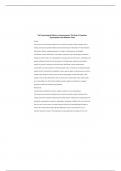The Psychological Effects of Imprisonment: The Role of Cognitive,
Psychopathic and Affective Traits
Unique
The current cross-sectional correlational review meant to research a bunch of mental, full of
feeling, and character qualities influencing the mental impacts of detainment. 93 male detainees
finished up a battery including proportions of insight, working memory, psychopathy,
forcefulness, restless characteristic, emotionality, rumination styles, and sympathy inclination.
Detainees' mental results were conceptualized concerning state of mind, tension, melancholy, and
general wellbeing. Results showed that prisoners with high mental capacities, psychopathic
impulsivity, proactive animosity, individual misery and dream, restless and pessimistic
emotionality are mostly inclined to sick being mental results. Contrariwise, the intrepid strength
quality, positive emotionality and empathic concern capacity appear to open prisoners to positive
mental results. Receptive animosity and viewpoint taking appear to affect both positive and
negative states of mind. Ruminative style was irrelevant to mental results. These starter results
give a knowledge into which factors mediation projects ought to be founded on to upgrade
prosperity and decrease trouble among detainees.
Watchwords
mental impacts, detainment, prisoners, influence, mind-set, tension, despondency
The current cross-sectional correlational review meant to research a bunch of mental, full of
feeling, and character qualities influencing the mental impacts of detainment, including good and
pessimistic temperaments, uneasiness, despondency, and general wellbeing. The review had zero
desire to zero in on the causes, yet rather centered exclusively around depicting the degree to
which a few characteristics might represent differential reactions to detainment as far as
detainees' prosperity and pain. The hypothetical casing supporting the ongoing review is the
, result of reflection on the viability and the convenience of a jail sentence. The discipline and its
execution in jail should be basically as close as conceivable to the character and qualities of the
guilty party. This would consider the discovery of hazard and security factors, as well as
unambiguous, individualized and customized assets for every detainee (Carillo, 2007). Alongside
the retributive, scaring, and guard/counteraction capability, discipline has a resocializing
capability intended for the social recuperation of the wrongdoer. Recovery treatment should be
individualized: It is accordingly essential to know a portion of the detainees' qualities (for
example mental, close to home, character abilities as well as shortfalls) and to execute programs
that incorporate exercises custom fitted to suit these elements.
The ongoing review is the result of a mindfulness that to boost the conceivable beneficial
outcomes of detainment and the viability of recovery programs, it is critical to get a customized
evaluation of detainees' dispositional qualities, with regards to their abilities or weaknesses. The
ongoing review put more accentuation on the mental,
profound and character factors influencing the mental results of confinement than on the
different impacts of de tention, for example positive/prosperity versus negative/sick being. For
instance, is enabling empathic abilities or mental capacities generally a helpful technique to
improve prosperity? On the other hand, might it be important to oversee ruminative propensities
to lessen trouble? Research questions like these directed the current review. Without making
complex trial guarantees, the current review endeavors to make a commitment toward this path.
The Mental Impacts of Detainment
There has been a perceptible upsurge in interest with respect to the mental and actual impacts of
detainment on prisoners (Morgan et al., 2019; Picken, 2012). The clinical and psychosocial
pertinence of these issues is continually expanding in accordance with the overall development




